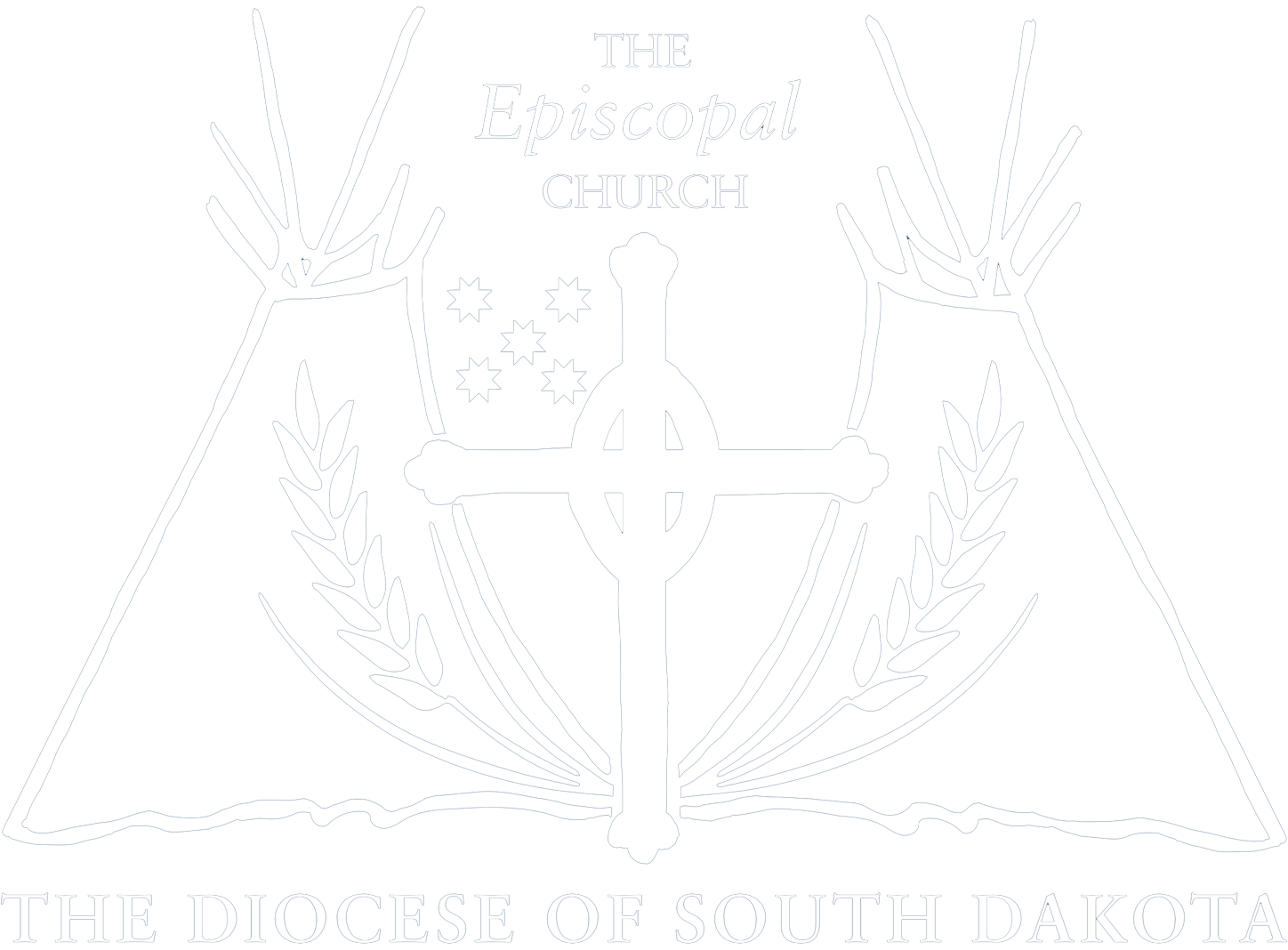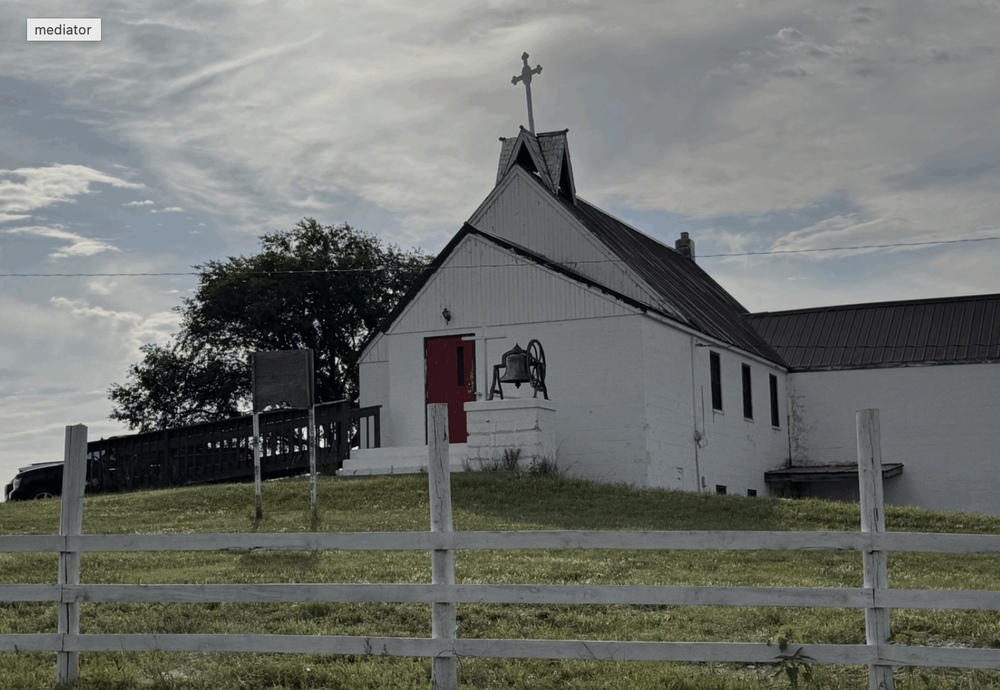From The Living Church, published July 23:
Mona Vocu is a member of the Lakota Nation, one of the largest subsets of the Great Sioux Nation. She is a cradle Episcopalian who’s been worshiping at Church of the Mediator in Kyle, South Dakota, for 30 years, and serves the congregation as a lay leader.
The parish opened in 1910 and is one of nine churches of the Diocese of South Dakota’s mission in the Pine Ridge Reservation—an area twice the size of Rhode Island. It has 20 regular parishioners but welcomed around 100 people on Easter Sunday.
“Our church is kind of out [there],” Vocu told The Living Church. “The village of Kyle is five miles away.” She noted the effort parishioners make to travel to the church for meetings, events, and morning worship, but they can’t “have long meetings or do anything because we have no utilities.” And by utilities, she means no running water or functioning bathroom, though the parish does have electricity.
“We have hand sanitizers, but that’s not the same as washing your hands,” Vocu said.
Very soon, parishioners and visitors of the Church of the Mediator will be able to fulfill a routine the World Health Organization calls “one of the most effective ways of keeping diseases at bay” without leaving its four walls.
Thanks to a United Thank Offering (UTO) grant approved by the Executive Council in June, the church now has the funds to install running water in the centuries-old structure. Vocu said parishioners will develop a blueprint and start vetting contractors soon, which is a bit challenging since outside vendors must first be approved by the tribe.
UTO was established in 1889 as an annual collection to support mission and ministry not covered by the Episcopal Church budget. The 2025 regular cycle for grants is focused on water, inspired by Jesus’ words, “I was thirsty and you gave me something to drink.” In its call for applications, UTO acknowledged “that many water access issues today stem directly from historic trauma and harm done to marginalized people.”
The Rev. Michelle Dayton, Superintending Presbyter of the Pine Ridge Episcopal Mission, was mindful of this when she applied for the grant, which she emphasized was something “I have never done … before in my life.”
“Water access and indoor plumbing in an Episcopal church seems like a 19th century issue; however, on the Pine Ridge Reservation, only three of the nine Episcopal Churches have such facilities,” Dayton wrote in the application. “For 115 years, our members have had access only to an outhouse, and needed to travel back to their homes to carry water in order to have it available for basic church functions.”
Dayton was particularly concerned for elders with mobility issues who attend Morning Prayer. “We cannot respect the dignity of every human being in the 21st century when we make them walk down the hill on their cane to an outhouse,” she told TLC. “The people of Mediator wanted to be able to use the church more fully so.”
All parishioners of the church are Lakota, and at times, to observe certain customs and traditions, they need to rent a hall. During funerals, the bereaved family provides nourishment to mourners and holds all-night vigils for up to three days—a practice Dayton said she hasn’t witnessed in other parishes, but which is a significant part of “when someone makes their journey to eternity here.”
For Dayton, who’s at Mediator at least once a month to celebrate the Eucharist, meeting this basic need means “bringing a smidgen of justice and hope.”
Several reasons have kept the parish from having running water. One is that the property is deeded to the church, consistent with the Dennis Canon. “So the tribe is under no responsibility for making that happen,” said Bishop Jonathan Folts of South Dakota. The cost of installing running water is around $69,000, and Folts explained that the diocese “does not have an extra $69,000 just sitting around to help these situations.”
The issue of water access is also not unique to Episcopalians in Kyle. It’s a problem Native Americans throughout the Pine Ridge Reservation have struggled with for generations. In 2019, a pipeline meant to deliver up to 20 million gallons of potable water daily to around 52,000 people in the area was reported to be beset by overspending and incompletion.
“The unfinished parts happen to be at the tribal ends of the pipeline and have become another example of unfulfilled promises by the federal government to Indigenous people,” Seth Tupper wrote for The Guardian.
Folts recognizes how the situation in Pine Ridge can be hard to grasp.
“What do you mean you don’t have running water? What do you mean you don’t have electricity? What do you mean you don’t have a church bulletin on Sunday mornings?” Folts said. “That’s the reality of a good number of churches and reservations in South Dakota. Not the majority of them, but a number of them … have to make do in other ways, so to speak.”
That’s why Folts warns clergy thinking of ministering in the diocese that if they’re someone who becomes upset because there’s a mistake in the church bulletin, “you will not survive here.” To be a minister in South Dakota means “you learn really quickly what is really important, and you learn how to make do.”
Dayton originally applied for the maximum grant of $55,000 from UTO to help cover the cost of installing running water. The parish was prepared to seek other grants, hold bake sales, and raffle off star quilts to make up the balance. Almost half—or $30,000—of the $69,050 budget is for the septic system alone.
The UTO Board, however, decided to grant the entire amount the church needed. Folts, who’s a member of Executive Council, was in the room when the grant for Mediator was approved. It happened during a session when a very large group of items was being reviewed for approval.
“I was really looking forward to that vote,” Folts said. He wanted to be the first to tell Dayton the good news. “And as soon as it was done, my thumb hit that send button.”
His text message: “Congratulations!!! Y’all just got approved for a $69,050 grant!!!! 🎉🎉🎉🙏”

